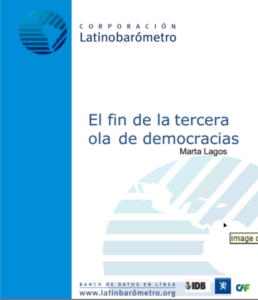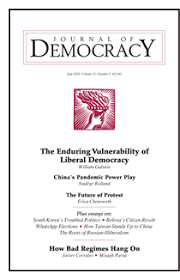
Latinobarómetro
Postponed elections. Sidelined courts. A persecuted opposition. As the coronavirus pandemic tears through Latin America and the Caribbean, killing more than 180,000 and destroying the livelihoods of tens of millions in the region, it is also undermining democratic norms that were already under strain,
Leaders ranging from the center-right to the far left have used the crisis as justification to extend their time in office, weaken oversight of government actions and silence critics — actions that under different circumstances would be described as authoritarian and antidemocratic but that now are being billed as lifesaving measures to curb the spread of the disease.
The gradual undermining of democratic rules during an economic crisis and public health catastrophe could leave Latin America primed for slower growth and an increase in corruption and human rights abuses, experts warned. This is particularly true in places where political rights and accountability were already in steep decline.
 “It’s not a matter of left or right, it’s a general decline of democracy across the region,” said Alessandra Pinna, a Latin America researcher at Freedom House, an independent Washington-based research organization that measures global political liberties.
“It’s not a matter of left or right, it’s a general decline of democracy across the region,” said Alessandra Pinna, a Latin America researcher at Freedom House, an independent Washington-based research organization that measures global political liberties.
In 2018, only one in four Latin Americans were satisfied with democracy — the lowest number since Latinobarómetro began asking the question 25 years ago.
On the plus side, in the few democratic strongholds in Latin America, such as Uruguay and Costa Rica, leaders responded to the pandemic with efficiency and transparency, boosting public trust in the government. In the Dominican Republic and Suriname, incumbent presidents recently bowed out of power after losing elections that were held despite the pandemic, The Times adds.
 In many instances, judges and civil servants have resisted the attacks on democratic institutions during the pandemic, said Javier Corrales, a professor of Latin American studies at Amherst College in Massachusetts. “The defenders of liberal democracy in Latin America are not defeated,” said Mr. Corrales, a contributor to the latest issue of the NED’s Journal of Democracy. “It’s not an open terrain for would-be authoritarians.”
In many instances, judges and civil servants have resisted the attacks on democratic institutions during the pandemic, said Javier Corrales, a professor of Latin American studies at Amherst College in Massachusetts. “The defenders of liberal democracy in Latin America are not defeated,” said Mr. Corrales, a contributor to the latest issue of the NED’s Journal of Democracy. “It’s not an open terrain for would-be authoritarians.”







